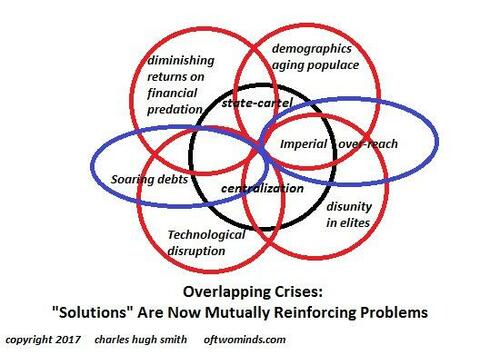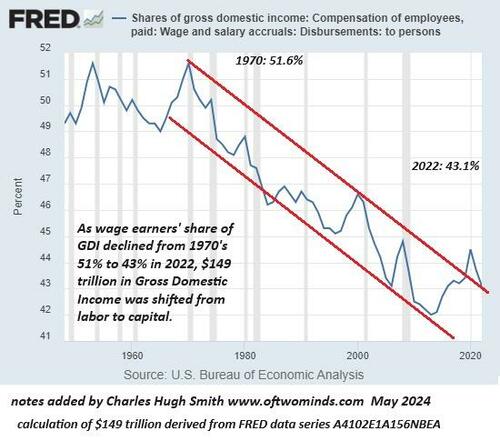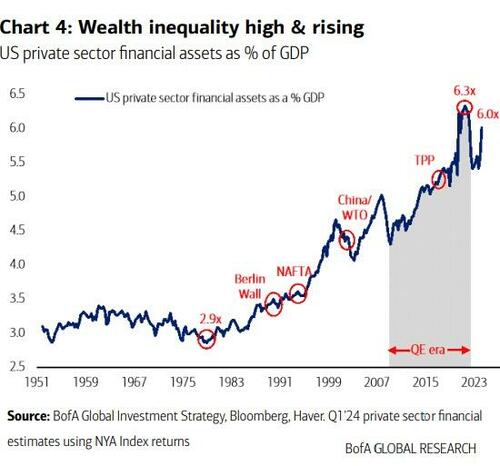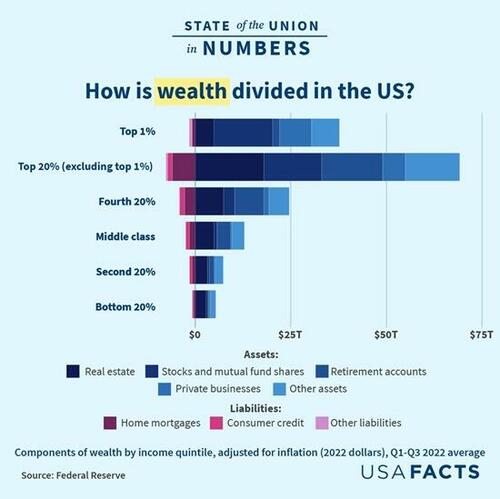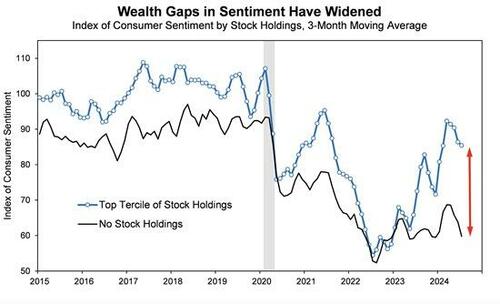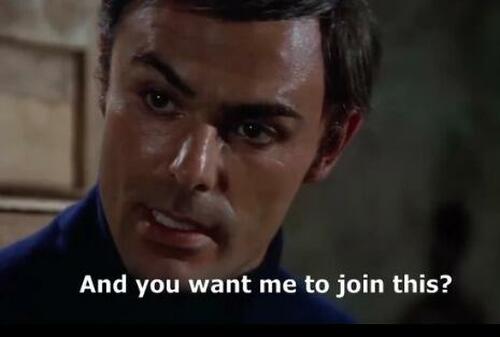Authored by Charles Hugh Smith via OfTwoMinds blog,
The less self-congratulatory camp of the super-wealthy understand the pressure cooker of inequality and unfairness is going to blow unless they relinquish some of their unearned gains generated by Fed policies.
The cultural consensus holds that the super-wealthy always manage to come out ahead in any spot of bother. Due to their grip on the levers of financial and political power, whatever lays waste to the bottom 90% of the populace is either 1) an opportunity to increase their wealth or 2) a minor bump in the road to ever-expanding wealth.
History offers an abundance of examples. A favorite of mine is the guest books of the French chateaus owned by the super-wealthy, which logged visits from the Usual Suspects (political and financial bigshots) until 1940, when the names of Nazi bigshots began filling the ledgers, and then in 1945, the visitor list reverted to the Usual Suspects: a seamless transition from one set of political overlords to the next that the chateau owners rode without difficulty.
But there are counter-examples as well. Consider the family estate of famed architect I.M. Pei in Suzhou, China. I visited the impressive Pei residence, which is now a government-owned property open to the public. The Pei family was wealthy enough to be comfortably in the top tier of Chinese society. Life was good for China's elite, right up to 1949. These elites did not glide though the revolution intact; their wealth was confiscated.
They were replaced with a new elite, who now holds vast troves of wealth secreted away in the West, and just as I.M. Pei attended prestigious American Ivy League universities, so too do the sons and daughters of China's party elites, under assumed names, of course, to allow them a private experience outside the limelight.
So the super-wealthy don't always skate through tumultuous times, emerging richer than ever. We all understand how vast wealth inequality influences the political and social responses to crises. What is less well understood is the role of fairness in the social and political realms: if the inequality is understood to be the result of extremes of unfairness, the public mood darkens considerably, as humans are innately sensitive to unfairness.
The porousness of the border between the wealthy and the poor matters greatly in assessing fairness. If the financial-social membrane between the two classes is relatively porous, enabling the most ambitious and brightest of the poor to enter the ranks of the wealthy (or the ranks of the the top 10% who serve them), then the society maintains a minimum level of fairness that alleviates the pressure to overthrow the regime.
The remedial actions of the state also matter greatly. If the government acts decisively to raise estate taxes, taxes on unearned (i.e. rentier) income and on the higher reaches of earned income, and devotes some minimal attention to the basic needs of the bottom 90%, these policies also alleviate the pressure to overthrow the regime.
The book The Great Leveler: Violence and the History of Inequality from the Stone Age to the Twenty-First Century addresses these dynamics in admirable detail.
In other words, extremes of wealth/power inequality set the stage, but the closing act is decided by our responses to soaring inequality. If the response is PR artifice, i.e. the rich keep getting richer as the suffering of the bottom 90% increases, regime change starts looking like the only solution available.
If, on the other hand, policy makers and the public push back against the dominance of the super-wealthy, then the status quo can avoid fragmentation and dissolution.
The super-wealthy play a key role in this choice of response, and this fragments the elites into warring camps, a dynamic I've addressed many times over the years, including in my chart of some of the overlapping crises that will demand more than duct-tape responses:
The backdrop is the policies that have handed the super-wealthy immense gains in wealth and power via policy-driven asset appreciation and the gradual diminishment of the purchasing power of wages. Over the past 45 years, the value of earnings has declined $149 trillion to the benefit of unearned gains reaped by the already-wealthy:
This chart shows how wealth inequality has risen from the late 1970s, and how it was rocket-boosted by the Federal Reserve's "wealth effect" policies of quantitative easing (QE):
The bottom 80% own a mere fraction of the wealth owned by the top 1% and top 10%
While the wealthy cling to the self-serving narcissistic view that since we're doing fine, everyone's doing fine, the reality is the bottom 80% are awakening to the reality that they're not doing fine, a divide that will only widen as recession tightens its grip on the throats of the bottom 80%:
This is the vision of the "our wealth is rightly all ours" camp of the super-wealthy: the rest of us will own nothing and we'll be gloriously happy. Uh, sure. Since we're so happy, why don't we switch places?
The less self-congratulatory camp of the super-wealthy understand the pressure cooker of inequality and unfairness is going to blow unless they relinquish some of their unearned gains generated by Fed policies. While they naturally intend on keeping the vast majority of their gains, they realize the dividends of limitless greed might just be the overthrow of the regime they control to serve their own interests.
The rest of us play a part, too, of course, and our choice boils down to this: "And you want me to join this?"
The super-wealthy have a problem: if they refuse to release the pressure building in a grossly unfair, rigged system that's enriched them beyond measure, then the pendulum may swing to the other extreme and they'll be visiting their former estates as tourists in a few years.
But if they agree to relinquish some part of their gains, they fear the tides of history may erode their sand castles. Aiya, what a dilemma.
* * *
